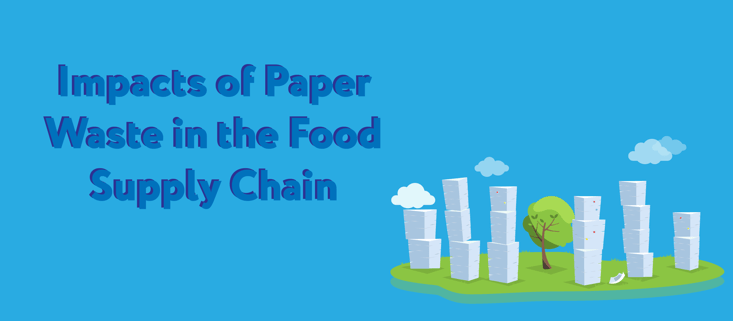
In a recent study carried out by Forbes, 60% of consumers confirmed they buy their products and services from companies that are socially and/or environmentally responsible. The idea of sustainable supply chains and ESG is not a new concept, with the first “eco-label” appearing in the 1990s- this now spanning over 200 “eco labels” available worldwide. With most modern businesses having various policies in place to tackle environmental concerns, the question remains - is this enough, especially for the more demanding modern consumer?
One key environmental concern for consumers is the level of waste produced by organisations - are businesses utilising resources efficiently, with ecological factors in mind?
Although many immediately think of packaging and food when discussing waste in the food industry, this sector is a major contributor to paper waste – paper being one of its largest by-products. Due to the ambiguity surrounding paper waste in food supply chains, we are delving in to the industry’s overreliance on paper, it’s impact and the future for paper-based processes.
End-to-end paper waste
Often overlooked, the impact of paper waste within food supply chains is a major concern, specifically for those using traditional pen and paper supply chain management processes.
In an industry where standards are of the utmost importance, a continual review and control process is required to track, manage, report, and audit processes, ensuring products are fit for consumption. As well as this, modern food businesses require the ability to interpret data and analyse performance frequently, playing a key role in strategic decision making, to improve efficiency and remain competitive. However, when you consider the number of reviews conducted daily, across varying levels within the supply chain- the resulting documentation can be overwhelming, especially when you factor in the physical storage and printing resources required to manage this quantity of paper.
For businesses utilising technology, this process is painless with audits, checks and accompanying documentation produced and shared digitally, removing the need for paper entirely. However, many organisations still rely on manual paper-based processes, (either pen and paper or print outs of spreadsheets) to carry out safety and quality checks, specifications, risk assessments, and more, which can quickly become outdated - leading to the growing volume of paper waste.
Interestingly, it was expected that with the digital revolution we would see a reduction in paper usage however, it has been predicted that the demand for paper will double by 2030 with the annual growth rate for paper within the average company currently sitting at 25%.
The reasoning? It’s largely believed that many still prefer traditional methods, feeling more comfortable and trusting of paper-based processes. However, this simple case of familiarity could be costing organisations hundreds of thousands a year, as well as damaging company image and ESG and sustainability initiatives – not to mention the world's rainforests!
It’s also counter-intuitive - the use of paper causing far more concern for security of information versus safe and often encrypted information stored securely online in a robust format.
Beyond the considerations of the physical waste involved, the resource, cost of purchase, and cost of physical storage assures us that continuing to use paper-based processes is a major strategic misstep.
A simple solution for an outdated problem
As much of this paper waste is created “behind the scenes” in food production, a part of everyday operations, it is not fully understood and therefore has resulted in less of a push to change. However, continuing to waste resources is no longer an option for any industry with growing social awareness, stricter standards and increasing legal and consumer pressures.
Businesses now have the responsibility to modernise their processes, introducing new methods to remove the need for large quantities of paper, which although sounds challenging, needn’t be with the development of simple digital technologies.
Digital technology is the modern cornerstone of innovation and thanks to its adoption within the food industry, we have already seen many businesses dramatically cut down their paper usage, whilst also benefiting from complete transparency over areas like product makeup, safety, trace data and more. All processes and documentation that were completed and stored manually, can now be effortlessly managed online, for easy access, decreased exposure to risk and streamlined communication.
Digital technology is supporting businesses across the globe to build strong and robust supply chains. Foods Connected go one step beyond this to offer one centralised platform to manage, track and control all their ESG activities as well as their entire end-to-end supply chain - specifically built with the needs of the food industry at the core.
Read: 3 Ways ESG Requirements Will Affect Your Food Business and Brands
Natalie Thorpe
A graduate of Letterkenny Institute of Technology, Natalie studied Visual Communication and Graphic Design. When she's not creating up new designs for company materials and branding, writing, compiling marketing plans or implementing new UX strategies, you'll find her roaming a deserted beach in search of her disappearing dog, or soaking up different cultures on her globetrotting adventures!
Stay up to date
Stay up to date
Browse Posts
- February 2026
- January 2026
- December 2025
- November 2025
- October 2025
- September 2025
- August 2025
- July 2025
- June 2025
- May 2025
- April 2025
- March 2025
- February 2025
- January 2025
- December 2024
- November 2024
- October 2024
- September 2024
- August 2024
- July 2024
- June 2024
- May 2024
- April 2024
- March 2024
- February 2024
- January 2024
- December 2023
- November 2023
- October 2023
- September 2023
- August 2023
- July 2023
- June 2023
- May 2023
- April 2023
- March 2023
- December 2022
- November 2022
- October 2022
- September 2022
- August 2022
- July 2022
- June 2022
- May 2022
- April 2022
- March 2022
- February 2022
- January 2022
- December 2021
/Blog%20Headers/shutterstock_2087508244.jpg)

/Blog%20Headers/shutterstock_1927957907%20(1).jpg)
/Blog%20Headers/shutterstock_1845178195%20(2).jpg)
/Blog%20Headers/shutterstock_2133827717%20(1).jpg)
/Blog%20Headers/shutterstock_2473376713.jpg)
/Blog%20Headers/shutterstock_2247276303.jpg)





/Blog%20Headers/shutterstock_2461210039.jpg)
/Blog%20Headers/Headshot%20B%26W.jpg)
/Blog%20Headers/shutterstock_1705229173.jpg)
/Blog%20Headers/AI%20Interviewees%20Blog_header.jpg)
/Blog%20Headers/shutterstock_2473679695%20(1).jpg)
/Blog%20Headers/CreativeNature.jpg)
/Blog%20Headers/shutterstock_1550290670.jpg)
/Blog%20Headers/shutterstock_1800794020.jpg)
/Blog%20Headers/The%20importance%20of%20supply%20chain%20traceability%20for%20food%20safety.jpg)